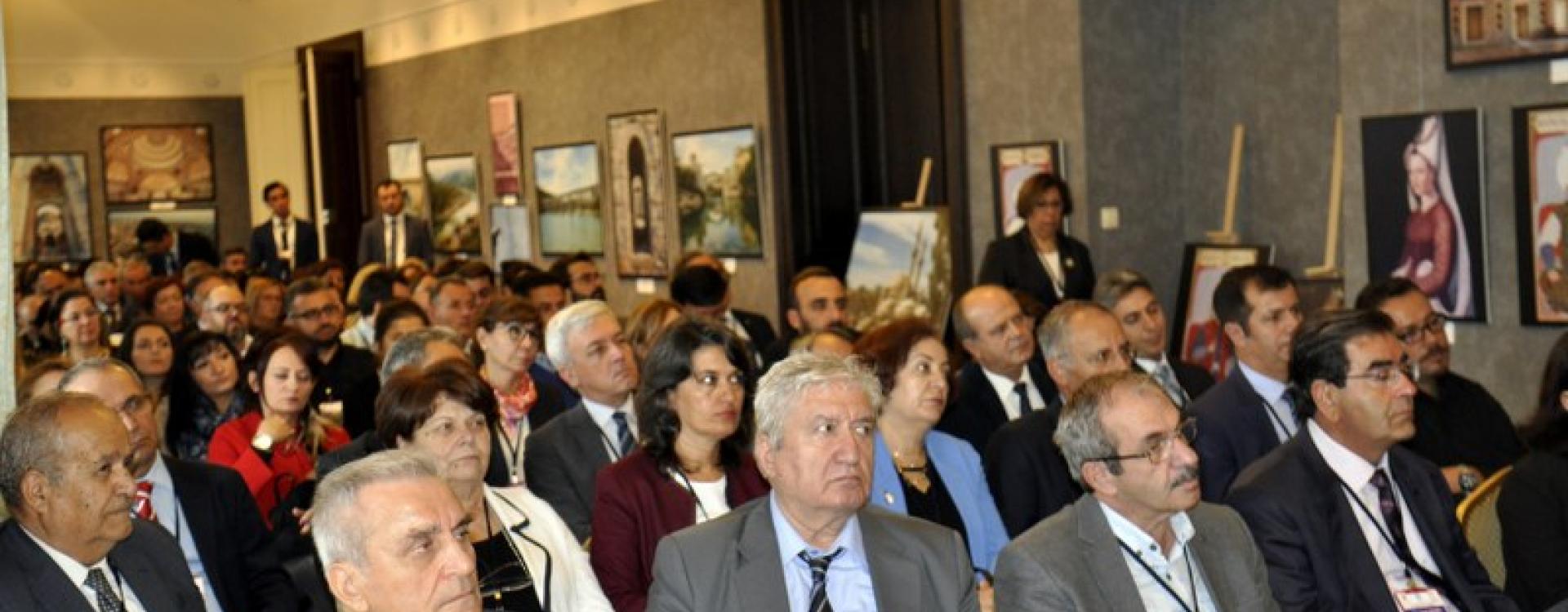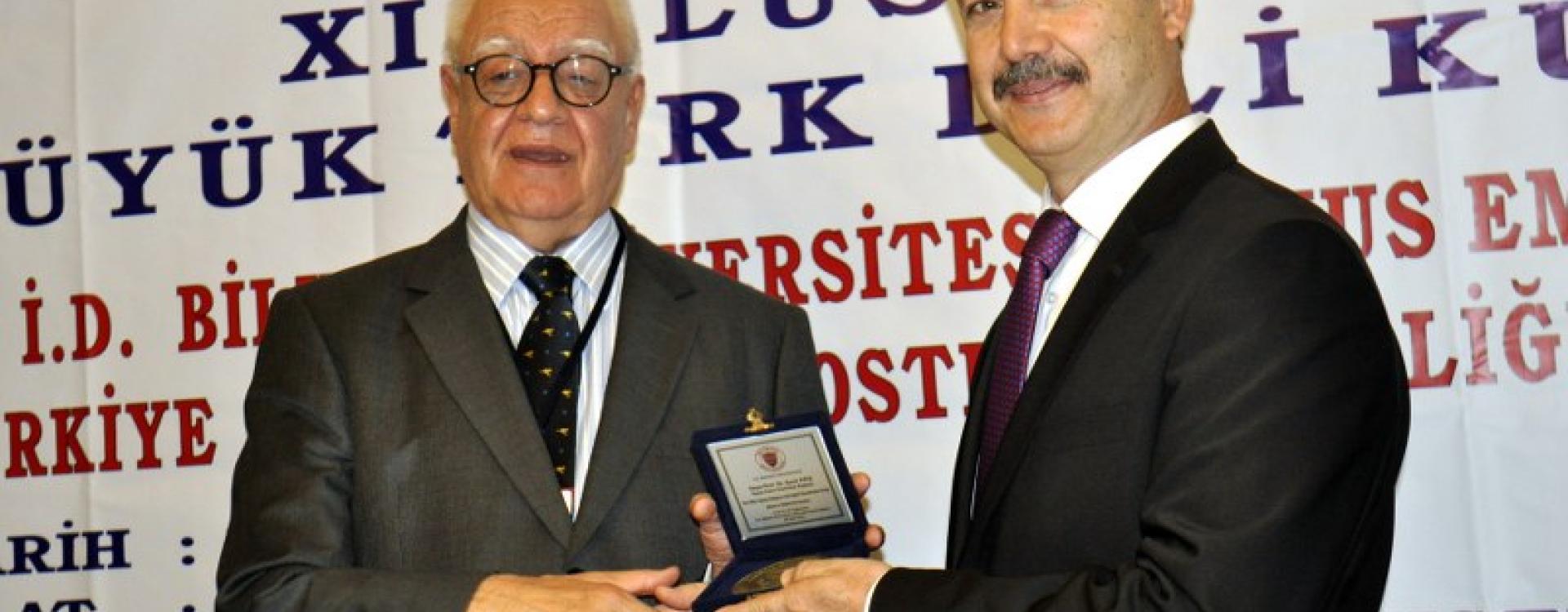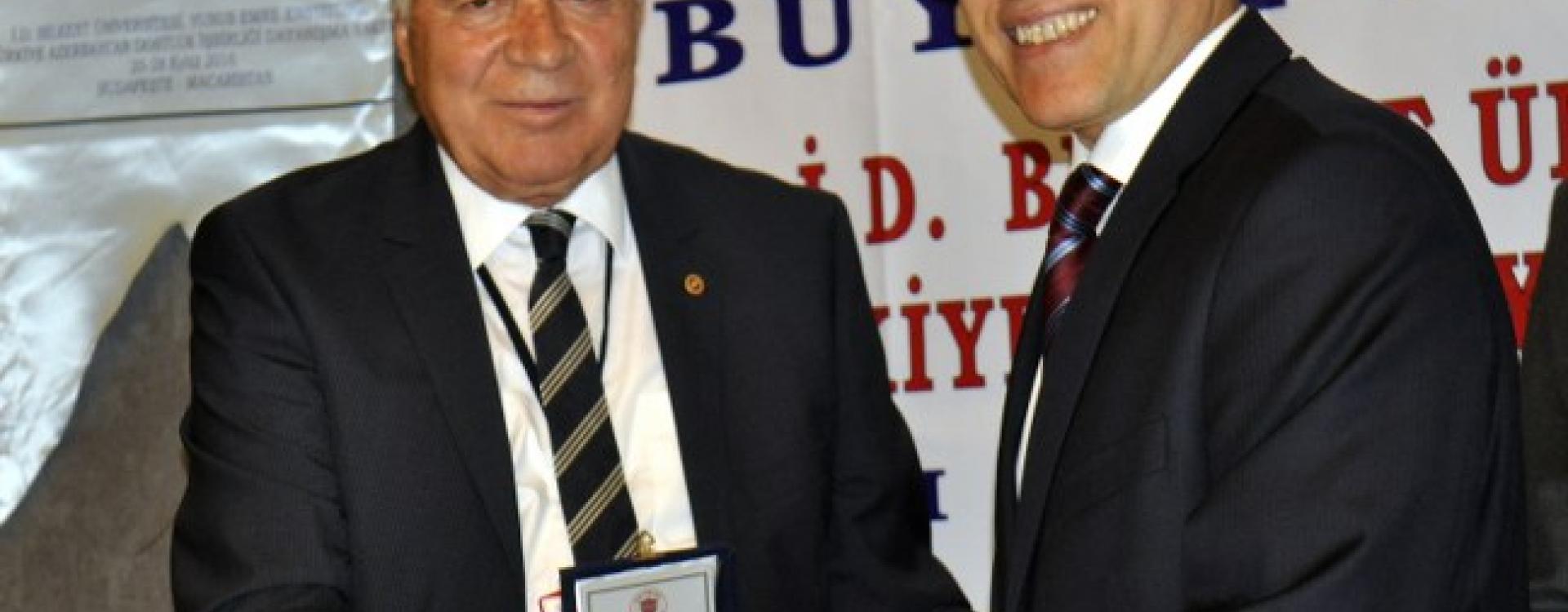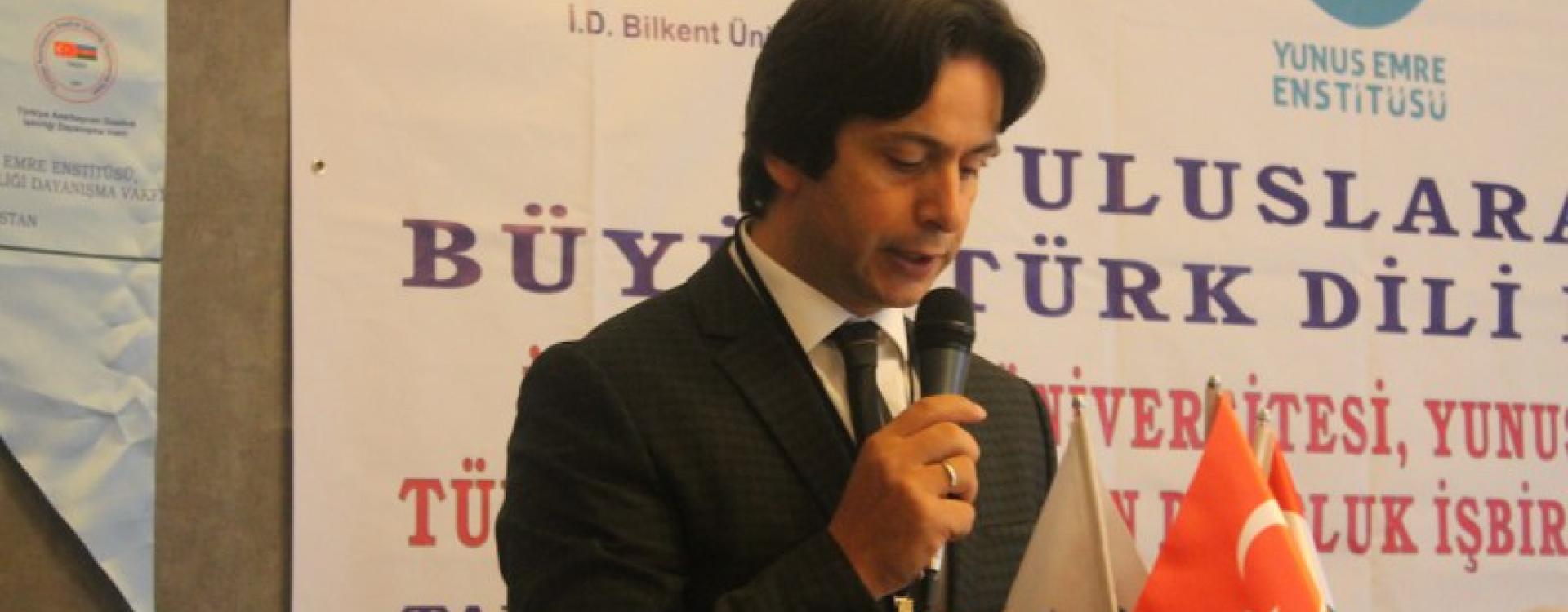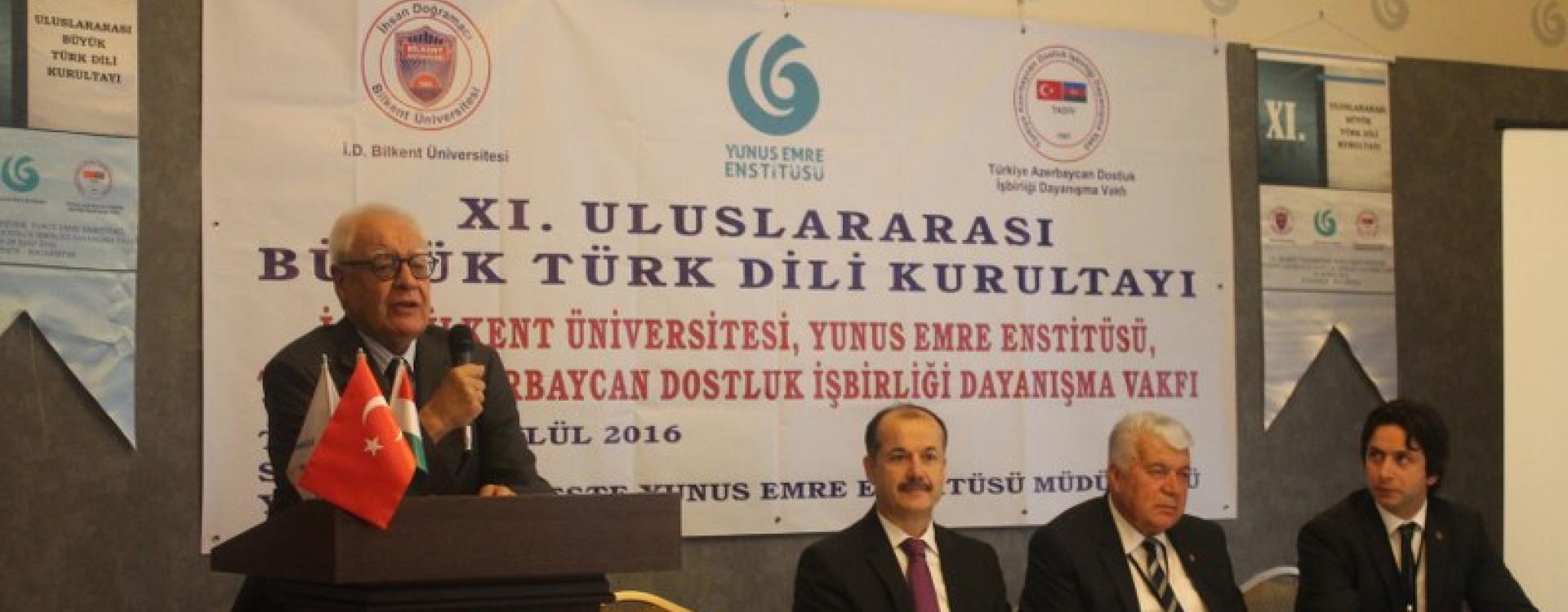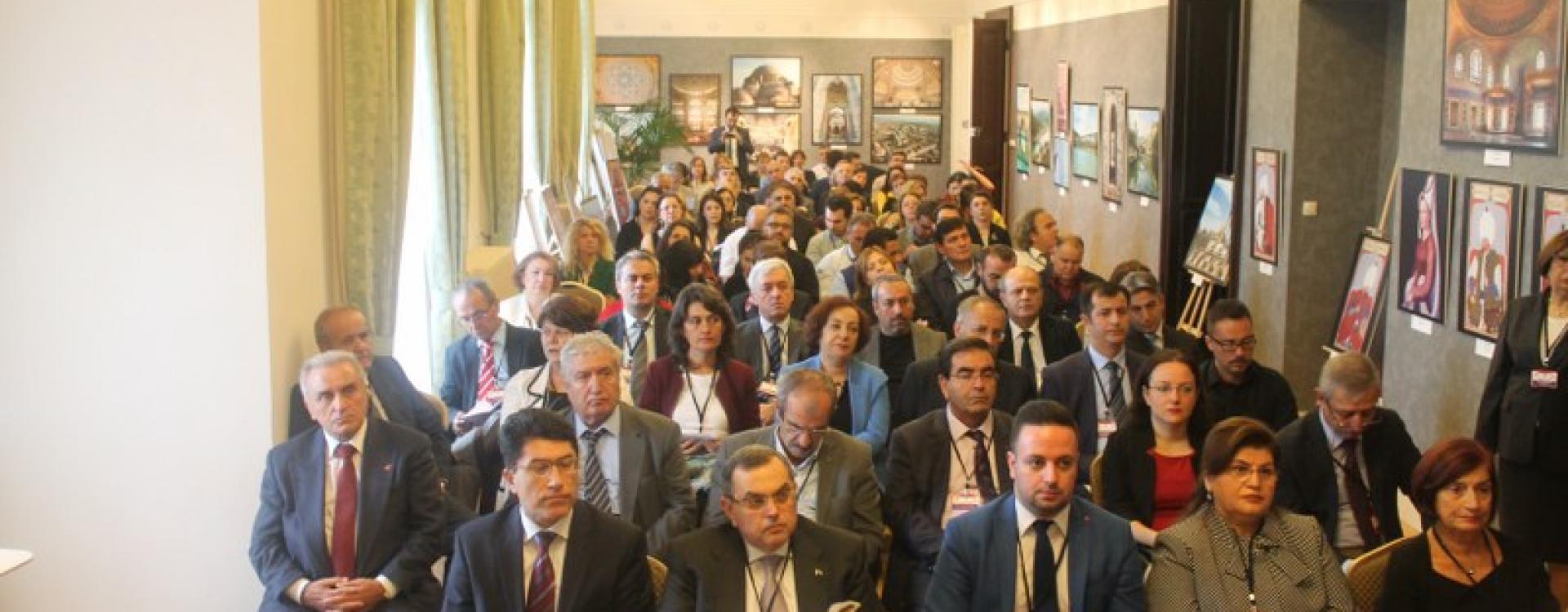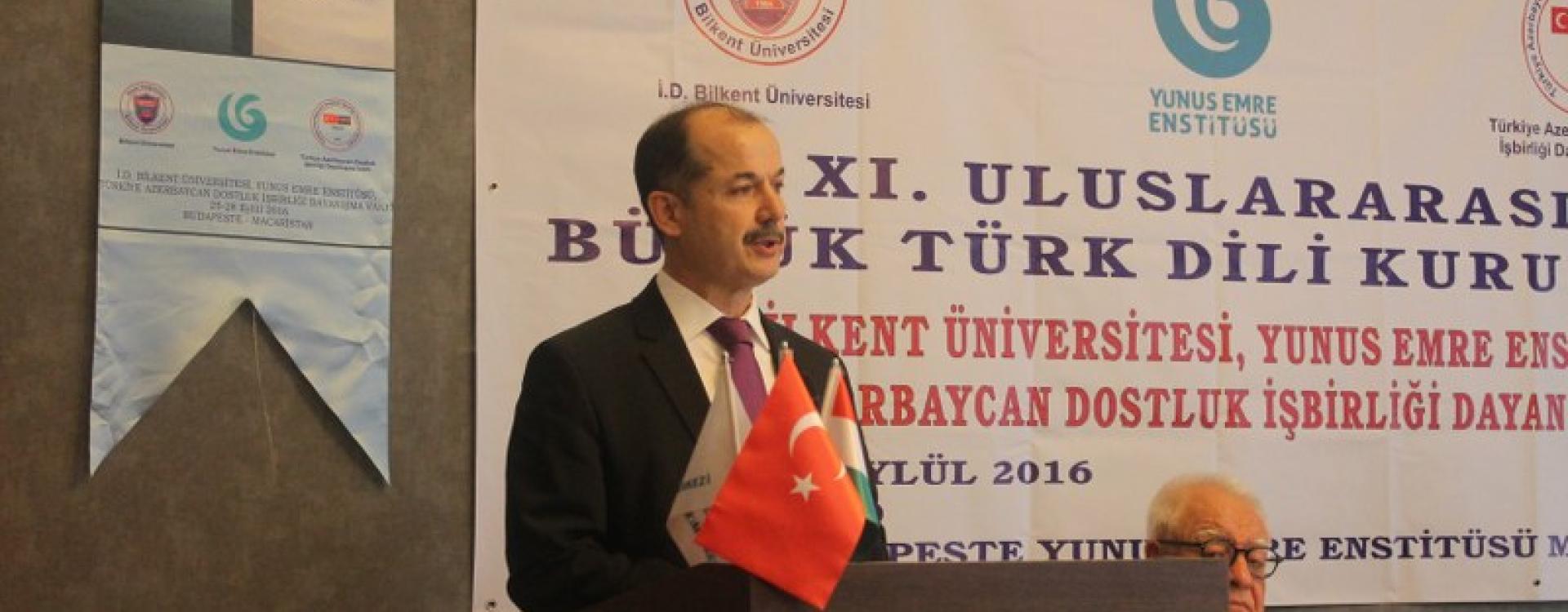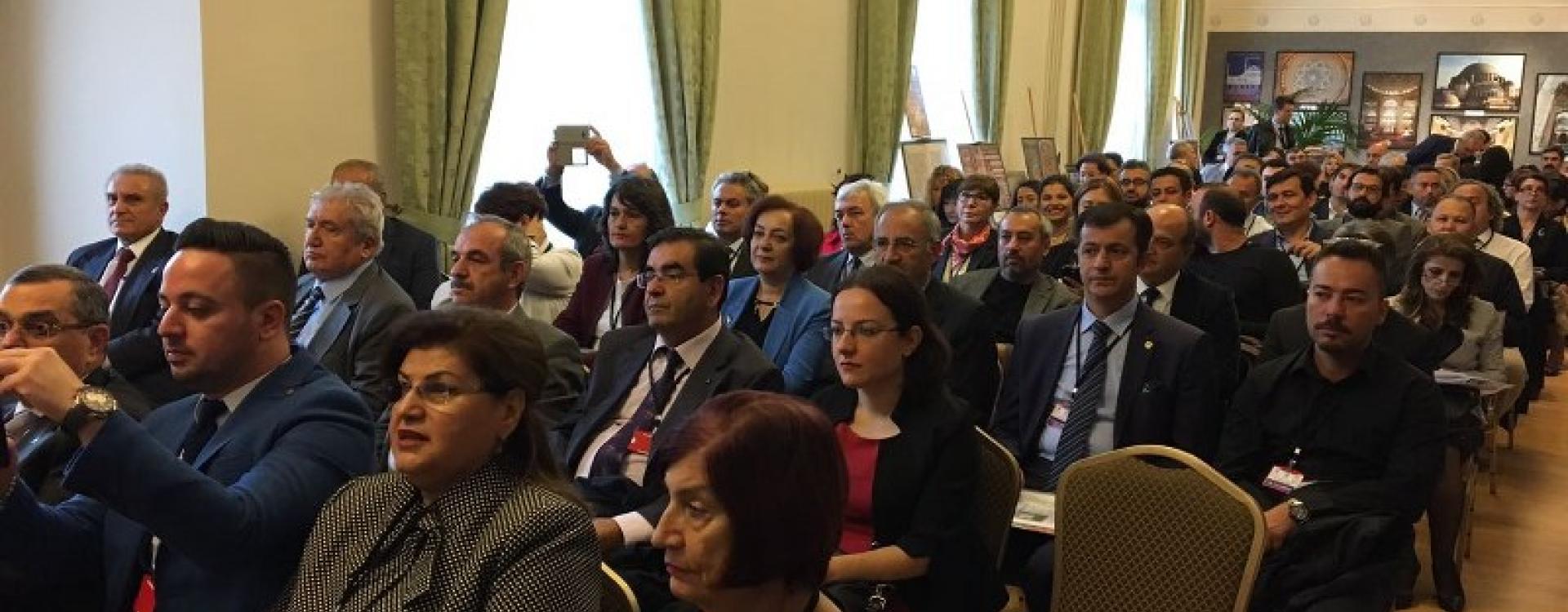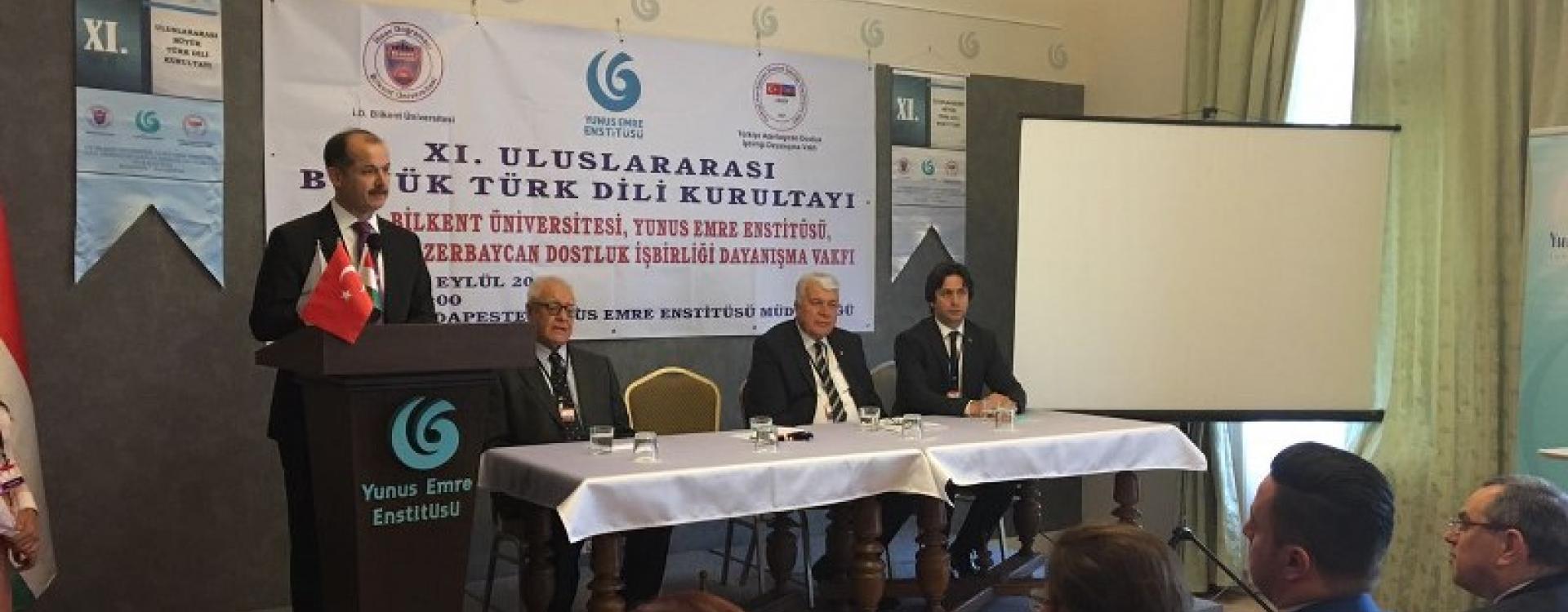11. International Grand Turkish Language Assembly Held in Budapest
11th International Grand Turkish Language Assembly was organised in Hungarian capital of Budapest, hosted by Budapest Yunus Emre Enstitüsü.
Bilkent University, Budapest Yunus Emre Enstitüsü and Turkey Azerbaijan Friendship, Cooperation and Solidarity Foundation collaborated for the 11th International Grand Turkish Language Assembly held in Budapest Yunus Emre Enstitüsü in Hungarian capital of Budapest.
Budapest Yunus Emre Enstitüsü Director Yakup Gül who made the opening speech in the Assembly, addressed the importance of the relations between Turkey and Hungary and continued as follows: “Our relations with Hungary have invariably been of importance due to our shared deep-rooted past, cultural background, cultural similarities and amicable approach of both nations. These relations have recently become even more meaningful. In 2013 'High Level Strategy and Cooperation Commission' was formed between Turkey and Hungary. Turkish Hungarian Trade House was inaugurated in Istanbul. Cultural centres have been opened in both countries. After Balassy Institute in Istanbul, Yunus Emre Enstitüsü became operational in Budapest on September 12th 2013.”
Yakup Gül addressing the activities of Budapest Yunus Emre Enstitüsü in his speech, spoke as follows:
“The library, expanded by book donations as part of 100 Turkey Libraries Project by Ziraat Bank, is open to public. Language instruction from beginner to advanced level is offered in Turkish courses in the Enstitü by expert instructors within European Framework of Reference for Languages. On the first Wednesday of each month, Hungarian experts give 'Turkish Coffee house Evening Seminars' in the Enstitü in various topics on Turkey and Turkish culture. Every Friday evening, as part of Yunus Emre chat sessions, a chat session over tea and coffee is held with locals who speak Turkish. In 'Turkish Cinema Evenings' organised on a monthly basis, unforgettable Turkish films meet with art lovers. In addition to exhibitions in Enstitü's exhibition hall, Turkey's cultural wealth is introduced in exhibitions organised in various prominent venues in Hungary. Turkish and Hungarian musicians perform in concerts, and Turkish jazz, classical and folk music songs are presented to music lovers. Home-cooking courses are organised with master chefs where secrets of Turkish cuisine are shared. In felting, ceramic and marbling courses, traditional handicrafts reflecting Anatolia's cultural wealth, are taught by craftsmen. Joint academic programs are carried out in universities and science academies with the aim of promoting Turkey, Turkish culture, history and language and establishing cultural bridges.”
"116 out of 332 declarations accepted"
Head of Assembly Organisation Board Bilkent University Faculty Member Assoc. Prof. Rasim Özyürek, marking that Assembly Organisation Board has accepted 116 out of 322 declarations, spoke as follows: “Science people both from Turkey and abroad will make presentations on the origins, historical periods, and sources of Turkish language; various topics in Turkish grammar, vocabulary and etymology of Turkish; degeneration and alienation in Turkish, issues and solutions regarding speaking Turkish in mass communication, and Turkish education and instruction throughout the Assembly. These declarations will be discussed with Assembly delegates and the audience.”
Head of Assembly Organisation Rasim Özyürek, stating that current state of Turkish will be discussed in the Assembly as well as the issues and solutions, reminded that the first Grand Turkish Language Assembly was gathered in Istanbul Dolmabahçe Palace on September 26th 1932 under the chairmanship of Mustafa Kemal Atatürk and anniversary of this event is celebrated as “The Language Festival”.
“Our Turkish could suffer a similar fate”
Head of Turkey Azerbaijan Friendship, Cooperation and Solidarity Foundation Prof. Dr. Enver Hasanoğlu relayed that 732 years ago, when Seljuk Empire was on the brink of disintegration, Karamanid Mehmet from Karamanids issued an edict requesting the following: 'From now on, Turkish will be spoken in the market, bazaar, school, everywhere'. Hasanoğlu continued as follows: “Had this edict not been issued, our beautiful Turkish language would suffer the same fate other languages did. Science people still talk about and discuss it but Turkish, a language of culture and science today, is already a strong language and has been the language of not just Turks but all the nations who live in this region.”
Hasanoğlu continued as follows: “We must carry out diversified operations to make Turkey stronger however in order to achieve that, we must first speak our own language in the best way possible. It is a scientific fact that those who cannot speak their language well, are not good at learning a second language.”
“We taught Turkish to 45 thousand foreigners”
Yunus Emre Enstitüsü President Prof. Dr. Ateş marking that “ Turkish instruction is undoubtedly a key element in intense cultural diplomacy efforts we have carried out to make new friends of Turkey and make it more popular,” expressed that they instruct Turkish and correctly explain ancient cultural values and people of Turkey. Ateş continued as follows: “Such that, nearly 26 thousand students have learned Turkish in our cultural centres since 2009. Considering the courses organised outside cultural centres, Turkish elective courses initiated by the Enstitü and support provided as part of Turcology Project, nearly 45 thousand students have learned Turkish.”
Prof. Dr. Şeref Ateş explained Turkish services provided by Yunus Emre Enstitüsü as follows:
“We both teach Turkish and try to explain our cultural sources through correct methods in our 45 cultural centres in 37 countries, in cities as Washington, Tokyo, the capital of The Republic of South Africa Pretoria and Polish capital of Warsaw. Of course we do not instruct Turkish and share our cultural values exclusively in our centres but by collaborating with universities that are science and technology centres, we make intense efforts to teach Turkish language and literature and make these more popular.
“Turcology Project has been carried out by our Enstitü since 2011 as part of the protocol we signed with Turkish Cooperation and Coordination Agency (TIKA).
“After taking over Turcology Project, YEE has established collaborations with nearly 100 universities worldwide with the aim of introducing Turkish language, literature and arts and to offer services to all university students abroad who want to get education in this field.
“As part of 'Turcology Project Cooperation Protocol', we assign Turkish faculty members to Turcology/ Turkish Language and Literature departments, give them support for curriculum and material, and make efforts to provide a higher-quality, continuing education.
“Additionally, thanks to '100 Turkish Libraries' project we carry out with Ziraat Bank, we have sent a library featuring nearly 2000 books to Turkish Language and Literature department libraries in universities abroad and offered resources on Turkish langauge to science people and students abroad.
“Our Enstitü has organised symposiums on Turkish language and Turkey by bringing together Turcologists around the world after taking over Turcology Project.
“Some of the scientific studies we have realised are Istanbul Gathering with Egyptian Turcologists, Turkey Studies in Today's Russia Symposium, International Turcology Workshop, Balkan Turcologists Meeting, Past, Present and Future of Crimean Tartars International Symposium, and Japan Turkey Workshop.
“Moreover we invite students who study in Turcology/ Turkish Language and Literature Departments of the universities and who learn basic Turkish to Turkey every year and organise Summer School Programs in 45 centres and 100 contact points. This way we get a chance to host Cultural Envoys who learn Turkish and wish to visit Turkey and get closely acquainted with them.”
"Budapest is not a city foreign to Turkish”
The last speech before declarations were presented, was given by Budapest Embassy First Undersecretary Alaattin Temür.
Budapest Embassy First Undersecretary Temür stated that Budapest is not a city foreign to Turkish and Turkish street names can be observed in many districts of the city.
Temur noted the following:
“You may come across city or avenue names as 'Atilla Street' or 'Turkish Avenue' while touring Budapest. According to a study, there are around 66 street, avenue or square names in relation to Turkey in Budapest. Turks and Hungarians have invariably had a relationship throughout the history. This is why scientists have always taken interest in studying Turkish-Hungarian relations.”
116 declarations presented
Following the opening speeches, 116 scientists presented declarations in a total of ten sessions. At the end of 11th International Grand Turkish Language Assembly where declarations were discussed, the final declaration prepared by the commission gathered under the chairmanship of Prof. Dr. Abide Doğan and Prof. Dr. Naciye Yıldız was presented to all delegates. After the presentation of the final declaration, participants visited historical monuments in Budapest.
